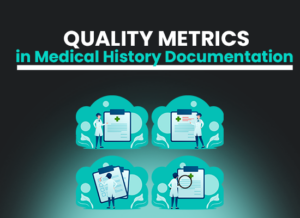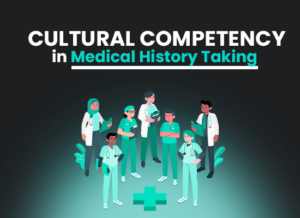Medication History: Best Practices for Documentation
- February 19, 2025

Table of Contents
A comprehensive medication history is essential to ensure safe prescribing. Proper documentation helps prevent harmful drug interactions, improves patient care, and supports better decision-making. By capturing detailed information about a patient’s medication use, healthcare providers can avoid potential risks and ensure more effective treatments.
Critical Elements to Capture in Medication History:
When gathering medication history, certain details are key to forming a complete picture of the patient’s health. These critical elements should be carefully noted during each patient interaction. Failing to capture all the relevant information can lead to prescribing errors or missed opportunities to improve the patient’s health.
- Keep an updated list of current medications.
- Understand past medication trials to avoid repeating ineffective treatments.
- Always document known allergies and reactions to prevent risks.
Try it - Love it - Buy it
Avail Our Free Trial Now!

Current Medications:
It’s important to always note the patient’s current medications. This includes prescriptions, over-the-counter drugs, and supplements. Keeping an updated list ensures that healthcare providers are aware of everything the patient is taking.
Past Medication Trials:
Understanding the medications a patient has taken in the past can help avoid repeating treatments that may not have been effective. This includes both prescription drugs and other treatments. Knowing what has worked or failed in the past helps guide future treatment decisions.
Allergies and Reactions:
Identifying any known allergies or past reactions to medications is crucial. Allergic responses to certain drugs can be life-threatening. Documenting these helps avoid prescribing medications that could trigger dangerous reactions.
Why Detailed Medication History Matters?
Capturing these elements is not just for completeness; it directly impacts patient safety. A lack of accurate medication history can lead to serious health complications. Proper documentation helps healthcare providers to avoid dangerous drug interactions.
- Understand patient adherence to improve treatment outcomes.
- Document side effects to adjust treatments appropriately.
- Always ask about OTC drugs to avoid interactions.
Adherence Patterns:
It’s important to understand how well patients stick to their prescribed treatment plans. Knowing if a patient struggles with adherence can guide treatment adjustments. Discussing adherence openly with patients can help improve treatment outcomes.
Side Effects:
Patients may experience side effects from medications, even if they don’t immediately report them. Documenting any side effects helps identify patterns and adjust treatments. This process ensures that patients are receiving the most appropriate care.
Over-the-Counter Drugs:
Many patients use over-the-counter (OTC) medications in addition to prescriptions. These drugs can interact with prescribed medications. It’s crucial to ask about OTC drugs to avoid harmful combinations that might not be immediately obvious.
The Importance of Supplement Use in Medication History:
Many patients use dietary or herbal supplements, which can influence the effectiveness of their prescribed medications. These supplements are often overlooked in medication histories. By asking about supplement use, healthcare providers can get a fuller understanding of what might be affecting the patient’s health.
- Always ask about supplements, as they can interact with medications.
- Track potential drug interactions between supplements and prescriptions.
- Foster open communication to ensure patient transparency.
Herbal Remedies and Supplements:
Patients may not consider supplements important, but they can significantly affect drug efficacy. Some supplements can alter how medications work or cause harmful interactions. Always document any vitamins, minerals, or herbal remedies the patient takes.
Impact on Drug Interactions:
Supplements can interact with prescription medications, leading to unwanted effects. For instance, some herbs may reduce the effectiveness of blood thinners or other critical medications. Tracking these interactions helps prevent potential harm to the patient.
Open Communication with Patients:
Patients may not always be forthcoming about their use of supplements. It’s important to create an open environment where patients feel comfortable sharing this information. This transparency helps ensure safe and effective prescribing.
Ensuring Accurate and Up-to-Date Medication Records:
Medication history should not be treated as a one-time task. It is vital to keep the record updated with every patient visit. Changes in the patient’s treatment or lifestyle should be reflected in the medication history to ensure ongoing safety.
- Update medication history regularly to ensure accuracy.
- Encourage patient engagement for more accurate records.
- Share medication history across providers for better care coordination.
Routine Updates:
Medication history should be updated regularly to reflect any changes in the patient’s prescriptions or over-the-counter use. Regular updates help keep all involved healthcare professionals informed. This ensures that each decision made is based on the most current and accurate information.
Patient Engagement:
Encourage patients to update their medication history every time they visit. This can be done through simple questionnaires or interviews. Engaged patients are more likely to provide accurate and complete information.
Shared Access:
Sharing medication histories across different healthcare providers helps ensure all team members are on the same page. This can prevent unnecessary tests, reduce duplications, and avoid conflicts in prescribing. Shared information improves overall patient care.
Try it - Love it - Buy it
Avail Our Free Trial Now!

Conclusion:
In conclusion, a complete and up-to-date medication history is vital for safe prescribing. It helps prevent adverse reactions, improves treatment outcomes, and contributes to overall patient safety. By focusing on the key elements outlined above, healthcare providers can enhance patient care and avoid critical errors.
Read More Blogs
See what’s trending in the medical world with our blogs.




